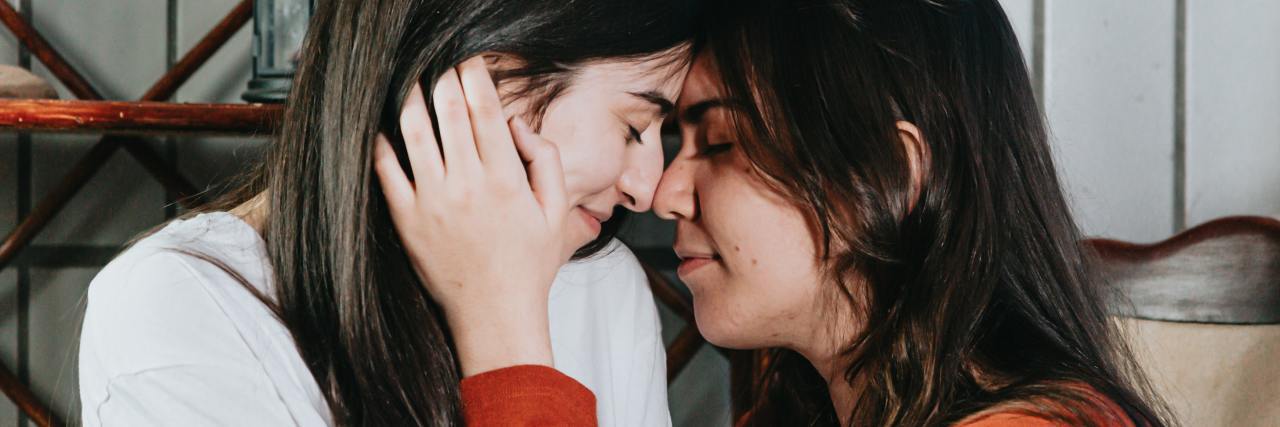How Alyson Stoner's Religious Shame Resonated With Me as a Bisexual
Editor's Note
If you experience suicidal thoughts, the following post could be potentially triggering. You can contact the Crisis Text Line by texting “START” to 741741.
“I felt stuck. I felt wretched. I felt like everything was wrong with me, even though I, in my heart of hearts, only desired to be a devoted follower of God…”
As I read through Alyson Stoner’s story on Insider, I instantly found myself connecting with her words on a profound level. In fact, I don’t think I’ve ever heard someone so accurately explain the pervasive shame and disconnection I feel quite like she did.
The 27-year old actress and newly published author shared with Insider about how her first experience of love with another woman sent her into a spiral so deep that she made the choice to admit herself to an outpatient form of conversion therapy in hopes that she could “veer away from being queer.”
Like Stoner, I grew up in a fairly religious household and spent years of my life confused by what I felt and what I heard from religious leaders and my own family. I attended weekly mass at the Catholic church my family members built when they arrived in the United States from Ireland in the early 1900s. I participated in the children’s choir, served as an altar server, and actively engaged in events at the church. I even had the opportunity to attend World Youth Day in 2002 and see Pope John Paul II.
Yet as I reached my teenage years, I couldn’t shake the feeling that I was somehow “unworthy” and “impure” because of my bisexuality and the sexual trauma I’d experienced. Like Stoner, I felt a deep sense of shame and distrust within myself because my reality didn’t line up with anything I’d heard during my upbringing.
Although I never attended any sort of conversion therapy, I did wrestle with several tough decisions during my teenage years as I tried to remain true to myself and my religious upbringing simultaneously.
I desperately tried to avoid going through Confirmation because I didn’t feel like I could fully commit myself to the Catholic Church unless I found a way to “become straight again” and “erase my sins.” I attended confession and told a priest about my fears. I read as much as I could about sexuality within the Bible and asked question after question in our high school youth group. Each time, another door slammed in my face and I finally found myself wondering if I should even continue to live if I was just “an abomination” — a feeling that Stoner also shared during her interview.
However, I’ve come to realize that the fact that I identify as bisexual doesn’t make me any less worthy as a person — it’s just as much a part of me as my red hair and my unique sense of humor.
Like Stoner mentioned in her interview, I still live with scars that run deep and I often find myself clinging to the darkness of my past before I was openly “out of the closet.” Even though I’m quite happy with my life and my choices, it’s hard to find a middle path as someone in a same-sex relationship who also longs for the same religious connection I felt during my childhood.
I think that’s a common struggle for anyone in the LGBTQIA+ community who wants to remain a part of organized religion. We spent our most formative years hearing that anything outside the box of cisgender heteronormativity isn’t acceptable in the eyes of God or Allah, and we internalized those words in a way that almost makes it impossible to ever shake off. As Stoner said so eloquently, we feel like we have to suppress one part of ourselves in order to fit within another, and the weight of that is often too much to bear.
By hearing stories like Stoner’s, however, I hope other people like me within the LGBTQIA+ community can find comfort and feel a little less alone. I hope that, together, we can all heal from the pain of our past and learn to fully embrace ourselves the way Stoner seems to now. And, with any hope, we can work to break down the barriers of an environment and time period that no longer serve Christianity or ourselves. No matter who we are or who we choose to love, we’re all fearfully and wonderfully made.
Photo by Ave Calvar on Unsplash

